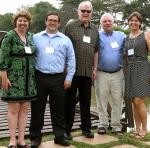COLUMBIA, Mo. – Mike Cook has earned the title hero—a cooperative hero.
On May 2, he was inducted into the Cooperative Hall of Fame at the National Press Club in Washington, D.C., after a public forum on cooperatives connected to the United Nations’ declaration of 2012 as the International Year of Cooperatives.
Cook has been a CEO and a mentor to CEOs of national and global cooperatives, counseled cooperative leaders in more than 40 countries, inspired students who have gone on to be leaders and award-winning professors, and worked to solve the global hunger problem since serving as a Peace Corps volunteer in Uruguay in the mid-1960s.
Cook, the Robert D. Partridge Endowed Professor in Cooperative Leadership and executive director of the Graduate Institute of Cooperative Leadership (GICL) in the College of Agriculture Food and Natural Resources’ (CAFNR) Division of Applied Social Sciences at the University of Missouri, joins the likes of Howard Cowden, who was the founder of the cooperative that became Farmland Industries. An endowment in Cowden’s honor started GICL, which Cook has overseen since 1993.
“The roster of the Cooperative Hall of Fame tells the story of the U.S. cooperative community through the lives and accomplishments of extraordinary individuals. Induction to the Cooperative Hall of Fame is reserved for those who have made genuinely heroic contributions to the cooperative community,” said Gasper Kovach, Jr., Board Chair of the Cooperative Development Foundation (CDF), which administers the Hall of Fame.
Cook is one of only six educators who have been inducted into the prestigious group since 1976. Dick Vilstrup, Cook’s mentor during his graduate studies at the University of Wisconsin, is one the others. Vilstrup introduced Cook to cooperatives. “I was inspired by his brilliant mind; every time I went to see him he had 10 new ideas and he was working on them all. He was fantastic,” Cook said of his former teacher.
A cooperative is a member-owned and -controlled business that operates for the mutual benefit of its members. More than 29,000 cooperatives operate in every sector of the U.S. economy and in every congressional district, generating 2 million jobs with annual sales of $652 billion, according to the National Cooperative Business Association.
In Missouri, nearly 500 cooperatives operate in areas such as agriculture, electricity and banking, employing more than 60,000 Missourians. Cook has made coops his life’s work, in the U.S. and in more than 40 countries around the world.
“Few educators are recognized and this confirms and validates what a unique program GICL has been over the past four decades,” said Kristi Livingston, a project development specialist in agricultural economics at MU who has worked with Cook for the last 18 years. She started working with Cook after taking his coops class.
“He has a unique perspective because he served in industry; he was a CEO of an agricultural cooperative and he takes that hands-on knowledge of how cooperatives work and function in the real world and that really guides all of the research that he does,” Livingston said. “He’s able from the advances in economics of organization theory to help cooperative leaders better understand the issues and challenges they face because he can use theory and research, but in a way that’s really applied. He is uniquely gifted in the way he bridges those two worlds.”
More than 2,000 cooperative leaders have graduated from the GICL institute. The GICL board is composed of influential leaders, such as Tom Payne, vice chancellor and dean of CAFNR at MU, and CEOs including Jerome Taylor, president and CEO of MFA Oil and a graduate of the GICL summer institute.
Taylor commented that MFA has hired several of Cook’s former students. In his letter to the Cooperative Hall of Fame selection committee, Taylor wrote the following: “Mike Cook has done more to refine, regenerate, empower and strengthen the cooperative form of business than any individual in this country, and perhaps globally, because his services are requested all over the world.”
The College of Agriculture, Food and Natural Resources is at the center of ensuring sustainability for future generations by infusing innovative research, creative collaboration and the most advanced science-based technology with confidence, creative thinking, conscience, and a commitment to excellence.
Read more http://extension.missouri.edu/news/DisplayStory.aspx?N=1412






